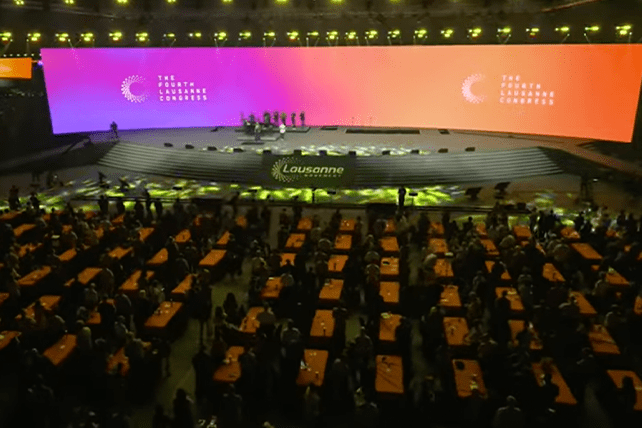Editor’s note: This article is part of forum discussing the fourth Lausanne Congress. It is not an official Lausanne Movement forum but an opportunity for Lausanne delegates to share their thoughts about the fourth Lausanne Congress, the Seoul Statement, and the future of the mission. You can read the entire series, from diverse voices around the world here.
An overlooked feature in the early response to the Seoul Statement is that it is, well, a statement. It is not a covenant, a manifesto, or a commitment, but a statement. As such, it differs not only in content and focus from the documents produced by the earlier Lausanne Congresses but also in purpose.
Unlike the three earlier Congress documents, the Seoul Statement does not attempt to combine a statement of faith with a call to mission action and commitment. Instead, the statement seeks to set out a carefully considered set of theological issues that were judged to be of particular concern at the present moment for undergirding faithful Christian mission in the decades to come. The challenge from the Lausanne leadership was to be biblical but also prophetic; to be faithful to Scripture but also to discern those areas where the faithfulness of Christ’s church is likely to be most severely tested as it seeks to obey Christ’s commission in years to come.
Before turning to the way in which this understanding of purpose gave rise to certain features of the Seoul Statement, let me say a bit more about what the statement is not. First, though it is a statement, it is not a statement of faith, for the simple reason that the statements of faith embedded in the previous Congress documents (especially those of the Lausanne Covenant and the Cape Town Commitment) have served and continue to serve the Lausanne movement well. Thus, there are a number of core doctrinal commitments to which the Statement does not devote extended attention, though all are present in a narrated form in the opening section of the Statement.
Second, though the Seoul Statement is a document prepared for a Congress on world evangelization, it says relatively little about mission practice and does not issue in a call to mission action. This was because the Seoul Statement, unlike previous Congress documents was released with a companion document—the State of the Great Commission Report. During the Congress, this latter document served as the basis for the call to Congress participants to commit themselves to collaborative action in a number of areas identified as strategically important in the ongoing task of obeying Christ’s commission.
Whatever one thinks of this particular feature of L4, it is important to see that, in distinction from previous Congress documents, this was not the aim of the Seoul Statement: to the extent that it can be understood as a call to anything, it is a call to faithfulness.
This particular focus of the statement is evident in every section, but Gospel faithfulness must, of course, must begin with the Gospel itself. So that is where the statement begins. There are many places in the world in which Christians have struggled to communicate the Gospel and struggled to live lives formed by the Gospel, because the story within which the good news of a crucified and risen Messiah makes sense has been distorted or poorly understood. This is a story that moves from creation to new creation and addresses the fundamental problem of human rebellion against God and the consequent refusal of the good of his creation. The stories about the world told by modern-day gnostics, the prophets of prosperity, or the ideologues of populism, progressive secularism, or garden-variety liberalism render the world in a very different way and diagnose the primary problem of humanity in very different terms.
Too often Christians have unwittingly inhabited one of these alternative stories and inevitably end up telling a distorted Gospel. Unless Christians turn from these alternative stories and consciously inhabit and skillfully tell the story about God and his world told in Scripture, Christian discipleship will falter and Christian mission to make disciples will fail.
That the Seoul Statement begins with an attempt to distill the story of Scripture—to show rather than tell—had a (hopefully) short-term downside. The early reaction to the statement tended to overlook what the Statement shows and to focus instead on what was said (or not said) on particular issues. Following the elucidation of the gospel as “the story we live and tell,” in Section I, the remaining sections can be understood as an attempt to draw out particular implications of the fact that the Gospel means what it means inside a particular a story, that is, as a story that we tell as we live and live as we tell—a story we only tell as well as we live and only live as well as we tell. This is to claim no more than what is already foundational within the Great Commission: Christ gives his commission to make disciples to disciples.
It is a mistake to try to work out whether it is more important to be a disciple or to make disciples. The Statement should thus be read as an attempt to provide theological grounding for faithful discipleship both as a presupposition and as an aim of Christian mission.
Here in North America, much of the early reaction to the Statement looked especially for how it would define mission, and, in particular, how it would define the relationship between verbal proclamation of the Gospel to pursuit of social justice. This was understandable, given the fact that the relationship between these two activities has been central to discussions of mission within Lausanne since the original Congress. This helped give rise to 50 years of missiological discussion of “integralism,” “prioritism,” or “integral prioritism.” So many early readings of the Statement naturally looked for how it would speak about this discussion.

